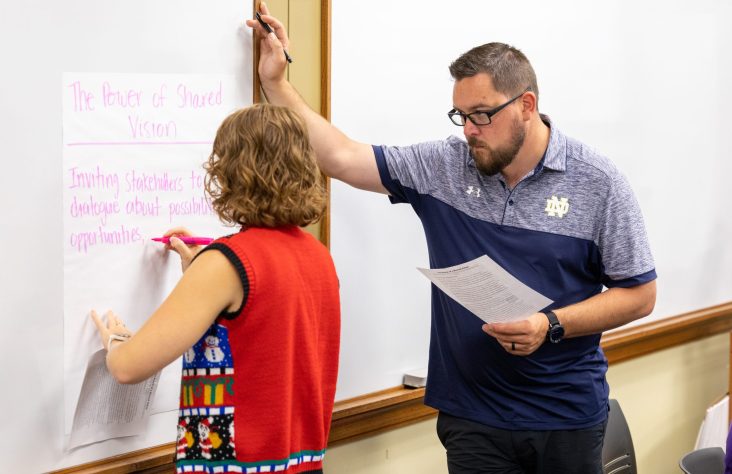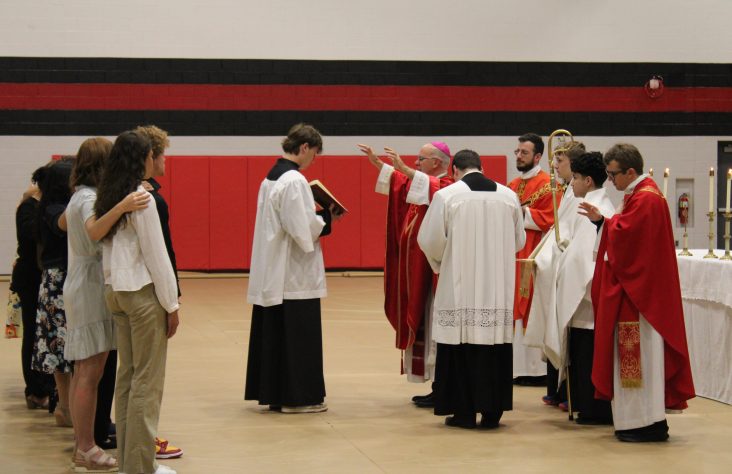January 25, 2020 // Diocese
Catholic Schools Office articulates long-term vision
Under Superintendent Dr. Joseph Brettnacher, the Diocese of Fort Wayne-South Bend Catholic Schools Office is committed to its mission and the beliefs shared by all diocesan schools, providing sound religious instruction based on the teachings of the Catholic Church and ensuring academic success for all students.
What’s new since 2019 — when Brettnacher was appointed superintendent — is a deliberate process to articulate a long-term vision and develop a strategic plan to carry it out. This process will eventually lead to Focus Accreditation, a new kind of accreditation at the diocesan level.
Input on establishing the vision has come from many different stakeholders, beginning with Bishop Kevin C. Rhoades and including those who staff diocesan Catholic schools. The Catholic Schools Office seeks to involve additional partners, including universities, national and local organizations, “to help our students to build Catholic values and morals, and excel spiritually, intellectually, physically and socially,” according to Brettnacher.
The vision the CSO has adopted centers around four categories: 1. Mission and Catholic identity 2. Governance and leadership 3. Academic excellence 4. Operational vitality.

Jennifer Miller
For the Catholic Schools Office of the Diocese of Fort Wayne-South Bend, achieving academic excellence involves curriculum development and extra-curricular experiences that are challenging, relevant, research-based and infused with the Catholic faith and traditions. Above, fourth graders depict saints that they researched for an all-schools Mass in South Bend in November.
Everything begins with Catholic identity, helping students deepen their relationship with Jesus Christ and understand the role of faith in their daily life and in larger society. One of the tools that will clarify this is the “Principles of Catholic Identity in Education” program developed by the Cardinal Newman Society, which enables schools to achieve the status of Catholic Education Honor Roll School.
Leadership includes recruiting and training principals, from promising classroom teachers to retired professionals. Parishes and the CSO will assist teachers in earning the necessary advanced certification, being trained in both state and diocesan assessment measures and learning about modern collaborative technology that will make their jobs more manageable. Principals and pastors will have opportunities to attend regional training on specific topics such as school advisory boards, tuition and contracts.

“The purpose of our schools is three-fold: to help our students to become disciples of Christ, fulfill their destiny to become saints and help them to reach heaven,” reads the vision statement of Catholic schools of the Diocese of Fort Wayne-South Bend. Each day, in those classrooms, students continue on that path.
Achieving academic excellence involves curriculum development and extra-curricular experiences that are challenging, relevant, research-based and infused with the Catholic faith and traditions. The tools available to improve academic excellence now include standard curriculum collaboration days, mechanisms to evaluate success and research-based interventions to handle challenges. An area of potential growth that the CSO has identified is the availability of prekindergarten programs.
Operational vitality secures the sustainability of a school’s finances, personnel, facilities and institutional advancement. Besides sound investments and facilities, ensuring operational vitality also can include employing marketing and branding strategies. The Catholic Schools Office plans to develop a toolkit each school can adapt to improve internal and external communication and increase enrollment.
What is essential about all this? As Brettnacher put it, “The purpose of our schools is three-fold: to help our students to become disciples of Christ, fulfill their destiny to become saints and help them to reach heaven.” Each day, in the classrooms of Catholic schools across the diocese, the students continue on that path.
The best news. Delivered to your inbox.
Subscribe to our mailing list today.






